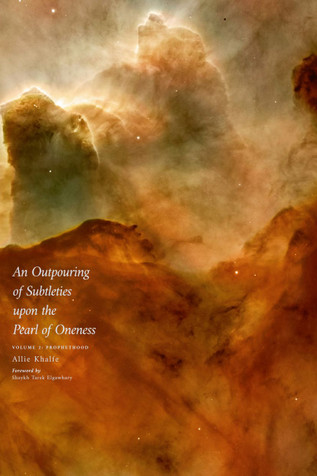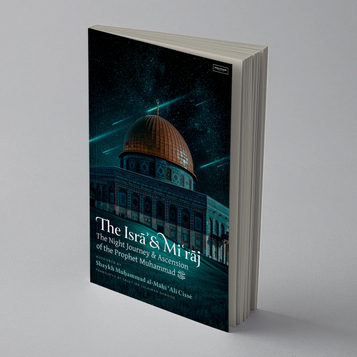Title: Subtleties of the Ascension, Early Mystical Sayings on Muhammad’s Heavenly Journey
Author: Abu 'Abd al-Rahman Sulami / Translated by Frederick S Colby
ISBN: 9781887752787
Publishing House: Fonsvitae
Early Mystical sayings on The Prophet Muhammad’s Heavenly Journey: The Isra wa Mi'raj
As compiled by Abu ‘Abd al-Rahman Sulami Translated and annotated by Frederick S. Colby
This first time translation into any language of a recently discovered tenth century manuscript provides a window into the thought-world of the early Muslim mystics known as the Sufis, and offers a comparative case of mystical exegesis for those interested in mysticism more generally.
Fifty-six teachings on a variety of ascension-related issues illustrate the profoundly creative imagination of such early Sufi mystics as Hallaj, Junayd, and Bistami, demonstrating their remarkable ability to mine gems of insight from the deepest depths of spiritual experience, and highlighting their abiding love for the Prophet Muhammad.
The book provides the essential framework for both novices and experts to understand how the early Sufis approached the Qur'an and the oral reports attributed to Muhammad, illustrated with stunning masterpieces of 15th century Persian miniature painting.
This extraordinary text illustrates how early Muslim mystics understood one of the key experiences in the life of the Prophet Muhammad, his night journey from Mecca to Jerusalem and his ascension from there to the heavens and into the divine presence. Muslims have discussed the meaning and significance of the night journey and ascension ever since the Prophet first described the events to his contemporaries upon his return. Sufi mystics have shown particular fondness for discussing the night journey and ascension, especially since a number of Sufis have seen in Muhammad’s journey a model for the mystic’s quest. Records of early Sufi discussions on the subject can be found in the Qur’an commentary of the tenth-century Sufi compiler Abu’ Abd al-Rahman Sulami and in the work of Sulami’s student Abu al-Qasim Qushayri. A recently discovered manuscript attributed to Sulami, however, preserves an even richer source of ascension-related sayings.
Entitled The Subtleties of the Ascension, Sulami exclusively dedicates this short Arabic work to recounting how the early Sufi mystics interpreted the Prophet’s journey. It represents the most extensive collection of early Sufi ascension sayings known to date. In this fascinating and insightful text, Sulami attributes fifty-six teachings on a variety of ascension-related issues to early Sufi masters such as Hallaj, Junayd and Bistami. Sulami’s Subtleties of the Ascension is an important addition to the growing body of woks on Sulami’s legacy and the formation of early Sufism, as well as a contribution to the study of other worldly journeys in general and of Muhammad’s night journey and ascension in particular.
The present volume contains the original text of The Subtleties of the Ascension from its manuscript in Arabic, together with Frederick Colby’s introduction, translation and commentary upon the text in English. It thus offers both the general reader and the learned specialist a lens through which to examine how Sufis of the formative period express and elucidate the mystical subtleties of Muhammad’s ascension, one of the central narratives of Muslim sacred tradition.
The story of Muhammad SAW's Night Journey and Ascension has enchanted Muslim audiences for centuries, and it became a central narrative in the life of the Prophet. It describes how angels came to Muhammad, brought him from Mecca to Jerusalem, and from there up through the heavens and back to Mecca, all in one special evening. While Muslim theologians debated about the exact nature of Muhammad’s travels, and Muslim philosophers interpreted the narrative as a Neoplatonic allegory, it was among the Sufi mystics that the journey made the most substantial impact. Some Sufis understood Muhammad’s Night Journey and Ascension as a metaphor for the mystical quest of returning to the divine presence. Other Sufis saw the journey as a blueprint for action, as an itinerary into the realms of the otherworld that they could follow through mystical experience.
The great early Sufi compiler and writer, Abu ‘Abd al-Rahman Sulami (d. 1021) lived during the time when the Sufi movement was just beginning to become standardized and systematized, and he forms a pivotal and transitional figure who records the wisdom of the early Sufi masters for later generations of Muslim mystics. In the work translated herein, Sulami collects reports of what these foundational sages said about Muhammad’s night journey and ascension, illustrating how they interpreted its significance in revealing the subtle realities of existence. The sayings take up the narrative threads from the Qur’an, the sayings of the Prophet known as hadith, and other versions of the night journey and ascension story and weave them into rich tapestries of discourse. They are sometimes obscure and sometimes transparent, but almost always lyrical and profound. This book includes not only a translation of the sayings that Sulami compiles in the early manuscript of his work, The Subtleties of the Ascension, a work never before published in any language, but it also provides extensive annotation and commentary in order to make these sayings more accessible to the general reader. It also provides an edition of the Arabic text and an appendix that would be valuable to the specialist. Finally, stunning illustrations of the night journey and ascension, drawn from a masterpiece of Persian miniature painting, accompany the text and add another dimension to its rich texture. The work thus will appeal to both generalists and specialists interested in mysticism, in Sufism, in otherworldly journeys, in medieval folklore, and in Islamic studies.
"It has been long recognized that the Heavenly Ascension and Night Journey (Isra wa Mi'raj) of the Prophet represent the paradigmatic spiritual experience for Muslim mystics. And yet there have been few monographs that study this important topic in depth. That lacunae has now been admirably filled by Frederick Colby's wondrous work, The Subtleties of the Ascension. This book features lucid translations and subtle analysis, and is recommended with heart and soul to students of Islamic studies, Sufism, and all who aspire to the Divine Presence in the fashion of the blessed Prophet of Islam."
-Professor Omid Safi, Colgate University
"The Subtleties of the Ascension is an important document of early Islamic spirituality, revealing the rich tradition of mystical interpretation of the Ascension of the Prophet Muhammad. This translation will be an important resource for Islamic studies, comparative religion, and mysticism."
-Professor Carl Ernst, University of North Carolina, Chapel Hill
"This priceless text is the earliest and most authentic source we have of the genre of mi'raj literature today. Al-Sulami, both a hadith scholar and a mentor of the Sufi Path, assures the authenticity of these traditions before they were lost in the popular apocryphal narratives such as the mi'raj text ascribed to Ibn Abbas. We owe a debt of gratitude to F. Colby for his well-documented and annotated edition of this authentic text of formative Islamic spirituality. The Arabic/English presentation of the text makes this work as valuable to the student of Arabic as it does to the student of early Islam."
-Kenneth Honerkamp, University of Georgia at Athens
 Canadian Dollar
Canadian Dollar














